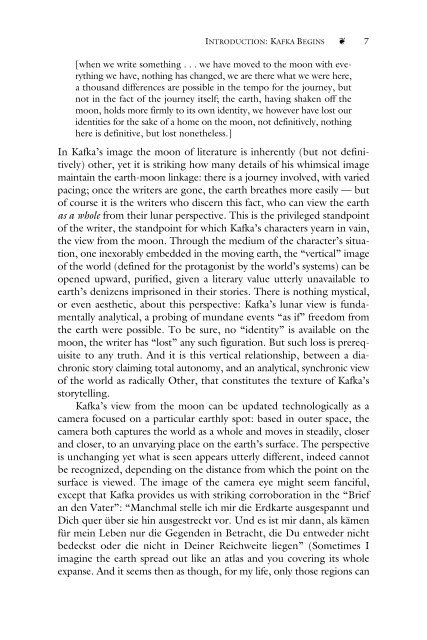Companion to the Works of Franz Kafka.pdf - tywls12ela
Companion to the Works of Franz Kafka.pdf - tywls12ela
Companion to the Works of Franz Kafka.pdf - tywls12ela
You also want an ePaper? Increase the reach of your titles
YUMPU automatically turns print PDFs into web optimized ePapers that Google loves.
INTRODUCTION: KAFKA BEGINS u 7<br />
[when we write something . . . we have moved <strong>to</strong> <strong>the</strong> moon with everything<br />
we have, nothing has changed, we are <strong>the</strong>re what we were here,<br />
a thousand differences are possible in <strong>the</strong> tempo for <strong>the</strong> journey, but<br />
not in <strong>the</strong> fact <strong>of</strong> <strong>the</strong> journey itself; <strong>the</strong> earth, having shaken <strong>of</strong>f <strong>the</strong><br />
moon, holds more firmly <strong>to</strong> its own identity, we however have lost our<br />
identities for <strong>the</strong> sake <strong>of</strong> a home on <strong>the</strong> moon, not definitively, nothing<br />
here is definitive, but lost none<strong>the</strong>less.]<br />
In <strong>Kafka</strong>’s image <strong>the</strong> moon <strong>of</strong> literature is inherently (but not definitively)<br />
o<strong>the</strong>r, yet it is striking how many details <strong>of</strong> his whimsical image<br />
maintain <strong>the</strong> earth-moon linkage: <strong>the</strong>re is a journey involved, with varied<br />
pacing; once <strong>the</strong> writers are gone, <strong>the</strong> earth brea<strong>the</strong>s more easily — but<br />
<strong>of</strong> course it is <strong>the</strong> writers who discern this fact, who can view <strong>the</strong> earth<br />
as a whole from <strong>the</strong>ir lunar perspective. This is <strong>the</strong> privileged standpoint<br />
<strong>of</strong> <strong>the</strong> writer, <strong>the</strong> standpoint for which <strong>Kafka</strong>’s characters yearn in vain,<br />
<strong>the</strong> view from <strong>the</strong> moon. Through <strong>the</strong> medium <strong>of</strong> <strong>the</strong> character’s situation,<br />
one inexorably embedded in <strong>the</strong> moving earth, <strong>the</strong> “vertical” image<br />
<strong>of</strong> <strong>the</strong> world (defined for <strong>the</strong> protagonist by <strong>the</strong> world’s systems) can be<br />
opened upward, purified, given a literary value utterly unavailable <strong>to</strong><br />
earth’s denizens imprisoned in <strong>the</strong>ir s<strong>to</strong>ries. There is nothing mystical,<br />
or even aes<strong>the</strong>tic, about this perspective: <strong>Kafka</strong>’s lunar view is fundamentally<br />
analytical, a probing <strong>of</strong> mundane events “as if” freedom from<br />
<strong>the</strong> earth were possible. To be sure, no “identity” is available on <strong>the</strong><br />
moon, <strong>the</strong> writer has “lost” any such figuration. But such loss is prerequisite<br />
<strong>to</strong> any truth. And it is this vertical relationship, between a diachronic<br />
s<strong>to</strong>ry claiming <strong>to</strong>tal au<strong>to</strong>nomy, and an analytical, synchronic view<br />
<strong>of</strong> <strong>the</strong> world as radically O<strong>the</strong>r, that constitutes <strong>the</strong> texture <strong>of</strong> <strong>Kafka</strong>’s<br />
s<strong>to</strong>rytelling.<br />
<strong>Kafka</strong>’s view from <strong>the</strong> moon can be updated technologically as a<br />
camera focused on a particular earthly spot: based in outer space, <strong>the</strong><br />
camera both captures <strong>the</strong> world as a whole and moves in steadily, closer<br />
and closer, <strong>to</strong> an unvarying place on <strong>the</strong> earth’s surface. The perspective<br />
is unchanging yet what is seen appears utterly different, indeed cannot<br />
be recognized, depending on <strong>the</strong> distance from which <strong>the</strong> point on <strong>the</strong><br />
surface is viewed. The image <strong>of</strong> <strong>the</strong> camera eye might seem fanciful,<br />
except that <strong>Kafka</strong> provides us with striking corroboration in <strong>the</strong> “Brief<br />
an den Vater”: “Manchmal stelle ich mir die Erdkarte ausgespannt und<br />
Dich quer über sie hin ausgestreckt vor. Und es ist mir dann, als kämen<br />
für mein Leben nur die Gegenden in Betracht, die Du entweder nicht<br />
bedeckst oder die nicht in Deiner Reichweite liegen” (Sometimes I<br />
imagine <strong>the</strong> earth spread out like an atlas and you covering its whole<br />
expanse. And it seems <strong>the</strong>n as though, for my life, only those regions can


